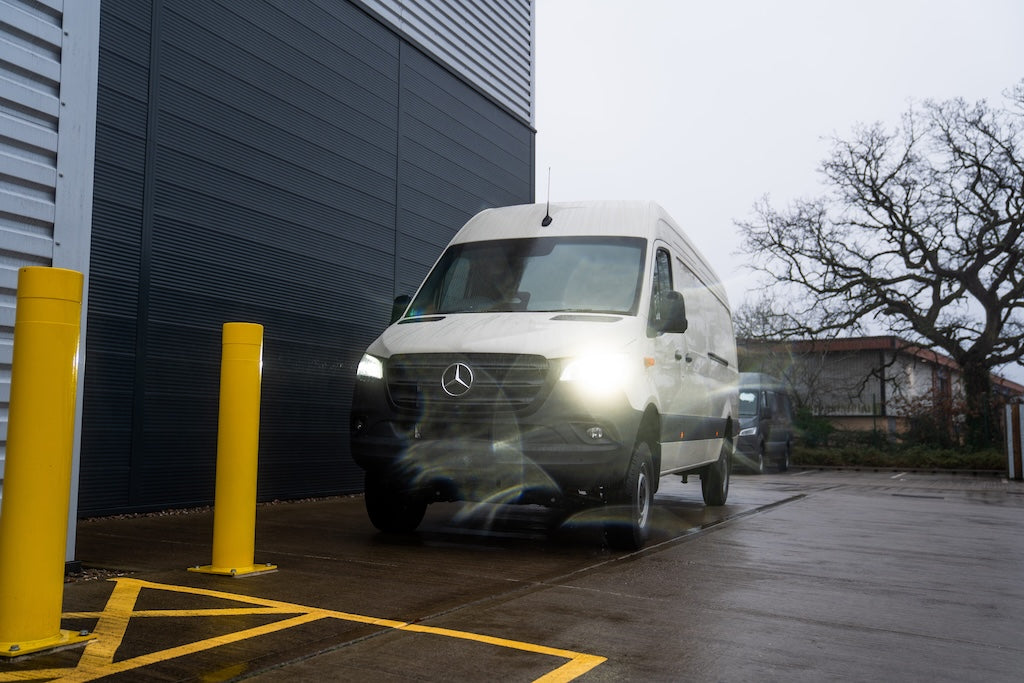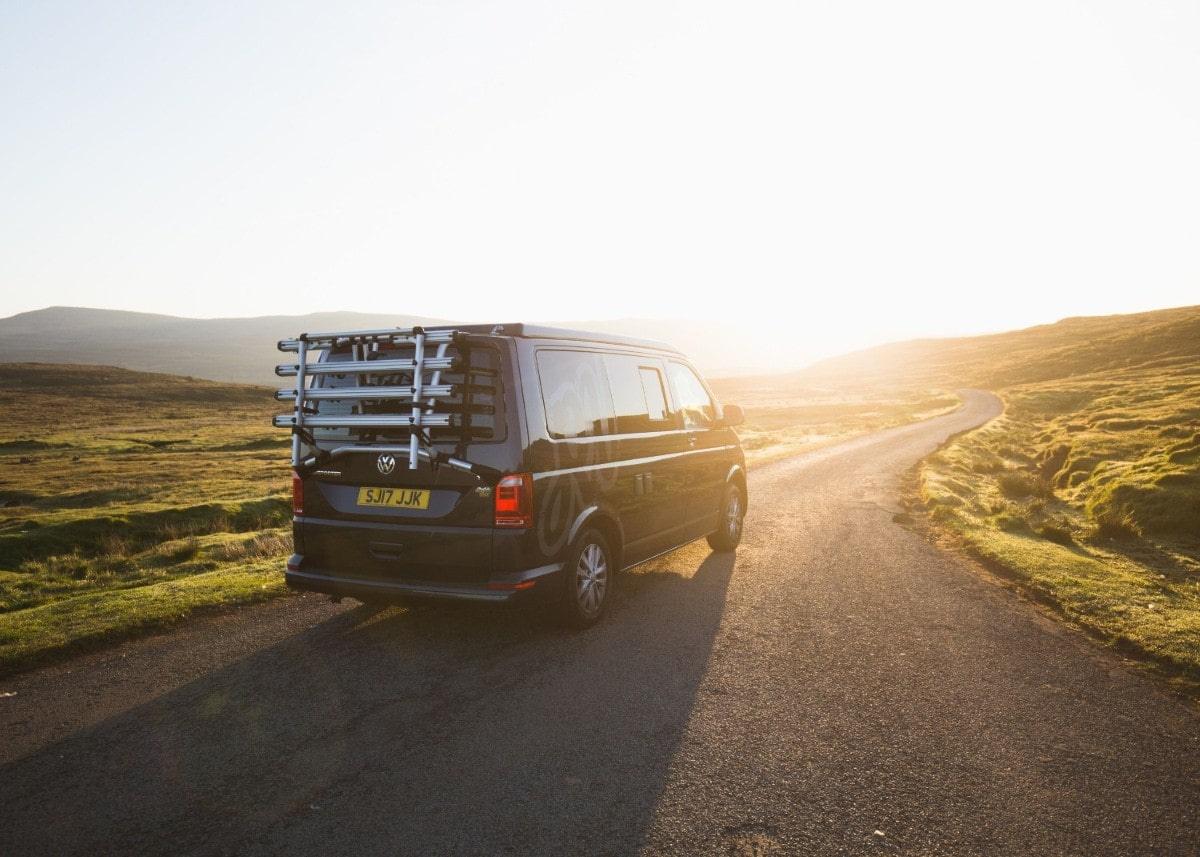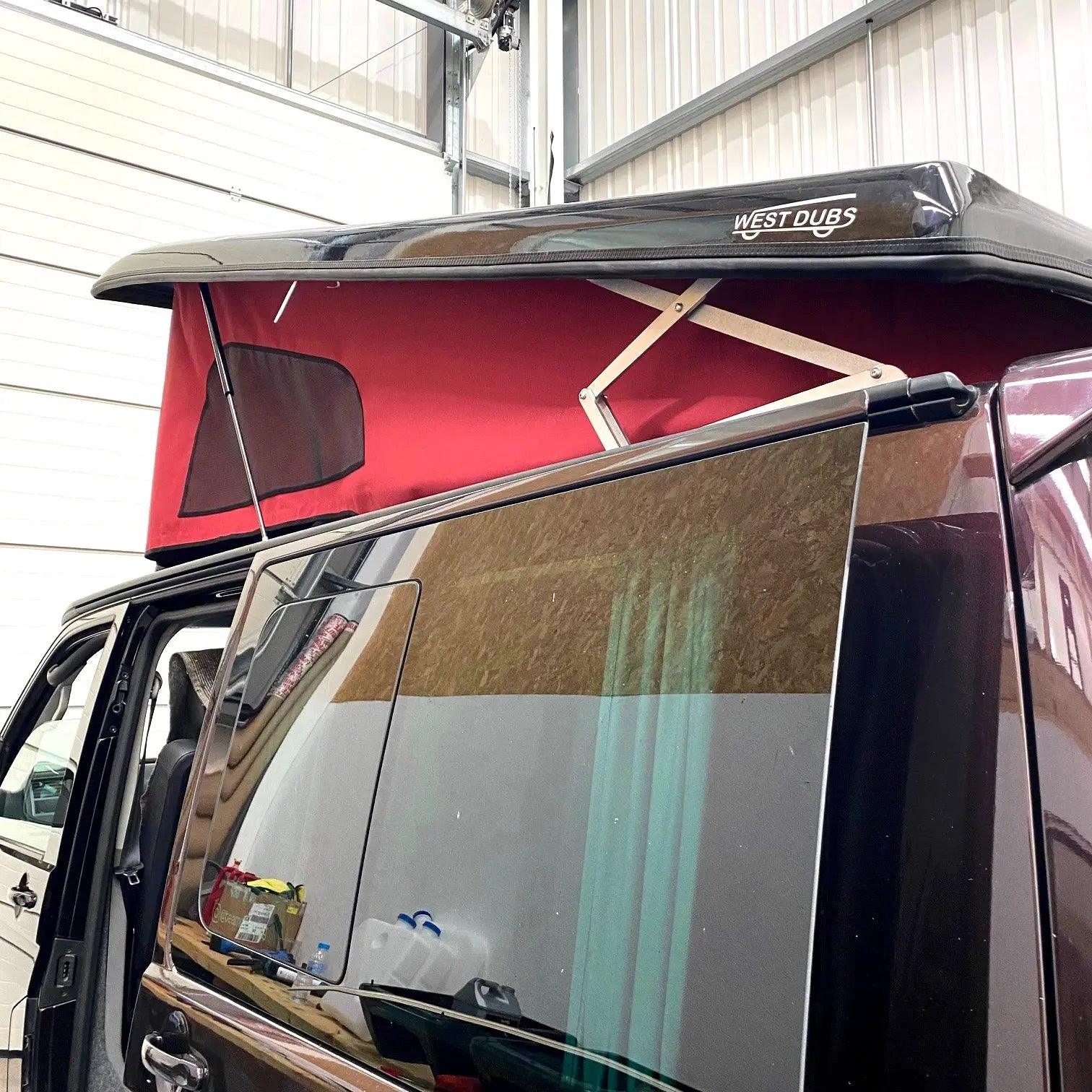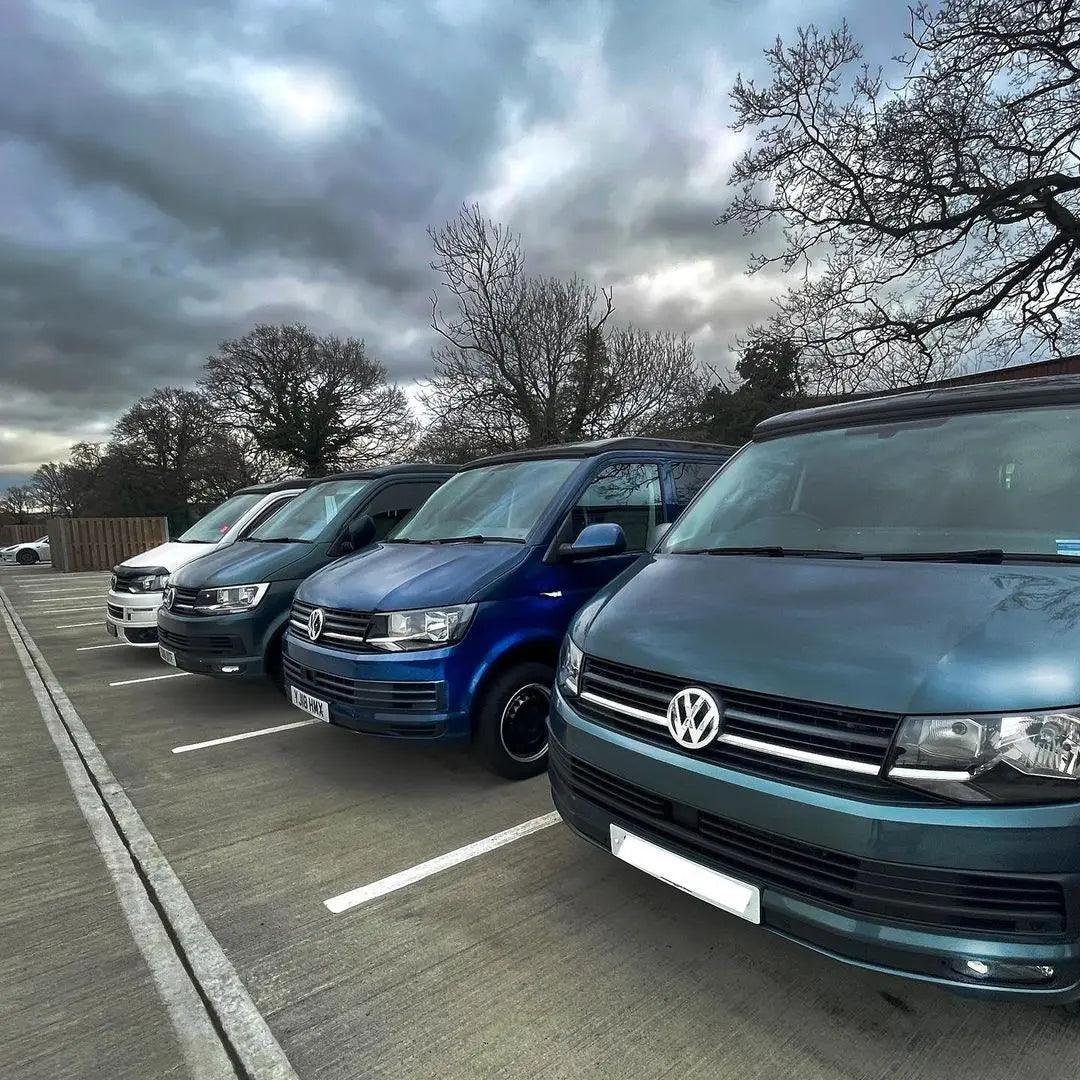Campervan Solar Panel from Wildworx - Perfect for your Camper Conversion
With a reported 8.25% increase in UK campervan ownership indicative of a trend for more local excursions and a change in mindset for many holidaymakers, you need to be sure you’re getting the most out of your vehicle when you’re out on the road. One way of doing this is by adding campervan solar panels and accessories that are both practical and sustainable in equal measure.

Campervan Solar Panels from Wildworx
At Wildworx, we specialise in a variety of campervan conversion services, from pop top roof conversions to the installation of effective heating systems as well as awnings and awning rails.
We offer two campervan solar panel options, fixed and freestanding.
Freestanding Solar Panel Kits
Freestanding kits are removable. You'll need to pack these inside your camper and put them out when parked up. These are usually a cheaper option but do tend to be smaller and therefore a less powerful option which requires a little extra work to set up for use each time.
There are some fantastic power banks on the market. Giving you a full battery system without having to fully commit. They can be pricey and you need to do your research before purchasing.
Fixed Solar Panel Kits
Fixed campervan solar panels will need to become a permanent fixture on the roof of your vehicle. They are maintenance-free and require no further set-up once installed. These will be hard-wired to your existing leisure battery system and can be more or less forgotten about as they work away in the background charging your batteries.
Both of these types of panels enable you to use solar energy to run the various appliances and electronic devices that make up your campervan, reducing your reliance on alternative (and infinitely more costly) methods of power.
- For most campervans, it is recommended that the solar panel kits you purchase are at least 100-watt Solar Panels. We like to pack a little more punch with a 180-watt panel. Check out our 180w solar panel kit here.
How Do Campervan Solar Panels Work?
Solar panels, also known as ‘PV panels’, are used to convert light from the sun into electricity that can be used to recharge your van's leisure battery. By installing solar panels to your campervan or kombi you can generate your own renewable electricity.
Solar panels for campervans work by obtaining energy from the sun and converting this into usable electricity, to power everything from televisions and fridges through to lighting and device chargers.
The materials featured in campervan solar panels come together to create an electric field, with the energy captured stored in the accompanying battery until it is required.
The wattage of your chosen solar panel should be fully reflective of your needs. The more electronic goods you need to power in your camper, the quicker your batteries will flatten and the more power will be required from a solar set up to recharge efficiently.
The higher the wattage of your solar panel, the quicker your batteries will be charged. Losing power can be frustrating when camping and if you have kids on board a solar panel may be indispensable to you at some point in your journey.
Each Solar Panel is made from layers of semi-conducting material, this is usually silicon, phosphorus (which provides the negative charge) and boron (which provides the positive charge). Solar panels absorb the sunlight and in doing so initiate the electric current.
-
Made from layers of semi-conduction material
-
Obtain energy from the sun
-
Convert this into usable electricity

Why Are Campervan Solar Panels Good For The Environment?
The advantages of solar panels have been well-documented, but it’s always good to have a little reminder.
One of their most important benefits is how they help to reduce carbon emissions. Unlike grid supplied electricity there are no pollutants involved in the creation of solar energy. When you plug your van in to shore power and a camp site the grid electricity comes from a power station and is mostly generated by burning fossil fuels.
By attaching solar panels to your campervan as you travel throughout the UK you’re doing wonders for your own personal carbon footprint.
Solar panels should last around 25 years. In our throw away society the longevity of these panels is a great win for the environment and our pockets.
If you have been thinking about living ‘off-grid' (living at a location that is not serviced by the main electric utility grid), solar panels are the way to go.
- Reduce emissions
- Solar Panels should last 25+ years
- Enable you to live "off grid" in your campervan
- Silent power
- Reduce usage of fossil fuels
- Free renewable power

Different types of solar panels available for your van, campervan or kombi
Before getting all kitted out with solar panels and the parts required, you have to think about the best suited Solar Panel for your type of van, campervan or kombi. Let’s take a look at the different types available on the market right now.
- Fixed or Ridged solar panel
- Semi-flexible
- Portable solar panels
Fixed Solar Panels
Fixed solar panels are the same as the panels you would have mounted to the roof of your house. They are rigid glass panels encased in an aluminium frame. They are the most economical and carry the longest guarantees. They tend to be more suitable for motorhomes and larger campervans mounted directly to the roof or roof rack.
Semi Flexible Solar Panels
Semi Flexible Solar Panels are thinner and have a flexible ETFE coating which allows them to be mounted to the uneven roof of your van or pop up roof of your campervan. They are very thin at 3-4mm thick. This way they’ll be always exposed to the sun, so they’ll be charging while you are driving too. They are a permanent addition to your campervan.
Portable Solar Panels
Portable solar panels are stored in your camper van while driving and you can only position them at the campsite or wherever you have stopped. We have noticed that many owners of campervans or kombis that are used as Day Vans choose to go for the portable solar panels instead of permanent solar panels.
- Flexible solar panels are most suited to install on your campervan
- They can attach onto any surface
- Can be walked on without damage
- Water and salt water resistant
Monocrystalline or Polycrystalline Solar Panels
Solar panels are made from two different types of material Monocrystalline or Polycrystalline. Let’s take a look at the two options. Monocrystalline cells are from a single source of silicon, which means they are more efficient but tend to be more expensive too. This Solar Panel is also smaller and more compact.
In comparison to Polycrystalline, these have blended silicon, which means they are cheaper and less efficient. Although they're cheaper, they might be less efficient. You’ll need to get more panels to get the same power that a Monocrystalline Solar Panel would give you.
Generally you don't need to worry about this. Most campervan solar panels on the market will be made from Monocrystalline material.
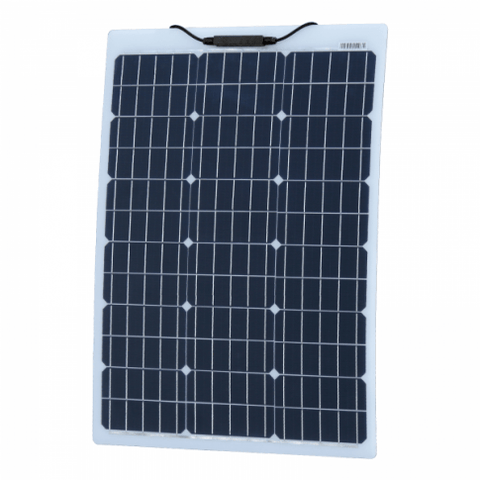
Campervan Solar Panel Watts
When researching solar panels you’ll need to look at the amount of WATT that the panels come in, this can be either 50W, 100W or 200W power. To work out the number of watts you need depends on what you are going to use the Solar Panel for.
The daily power consumption is referred to as watt-hours (Wh). There are a lot of calculators online to find out how much power you need, so please do check them out! If you are not quite understanding it all, our technicians will be more than happy to talk you through.
Solar Panel Weight on your Campervan Roof
Last but not least, the weight and size must be considered. As each van, campervan or kombi can mount x amount of weight onto the roof so you need to be sure it can support the additional weight of the panels. If you have a pop top make sure you check with your roof manufacturer to ensure you don't void your warranty.
Consider the extra space being used inside the vehicle, if you choose to go with a portable Solar Panel system.
How to install a solar panel onto your Campervan Pop Top Roof
There are two ways of installing a campervan solar panel. Either by using self-tapping screws or by bonding it down. At Wildworx we recommend bonding the solar panel onto your pop top roof. This is because your pop top roof is likely made from fibre glass and will leave a permanent hole. Fit your panel as close to the back of your roof as possible, but within the canvas. This means your wires will come inside the van.
- Bond your solar panel to your pop top roof
- Make sure you choose the correct location for your panel
- Ensure your solar panel has a rear cable junction housed under the solar panel. Meaning you don't see any cables from the inside
A full solar panel kit for your campervan will usually include:
- 180W semi-flexible solar panel
- 20A high efficiency MPPT solar charge controller with inbuilt LCD display
- Single core extension cables with MC4 connectors
- Dual-core battery cable fitted with a fuse holder
- 15A fuse
- 8mm ring terminals
You will need also need an additional leisure battery to ensure the system functions correctly.

Don't want a permanent Solar Panel on your campervan?
There are a few options if you want to avoid a solar panel being installed permanently on your roof. Our favourite is the Jackery Solar Panel Kit. This comes with a solar panel, a battery and an inverter. Great for weekends away at festivals to give you that extra power.
Leisure Battery
Having a leisure battery in your campervan is a great way of storing the electricity so you can use it later. As a very rough guide:
- A 250W of solar power will require one 100Ah battery to store the electricity generated
Campervan Inverter
An Inverter can convert DC battery electricity into standard mains electricity 230v. This makes using or charging your electronic devices with a 3-pin UK plug socket possible. Even when you're not plugged into a campsite. These devices might include:
- Laptop
- Hairdryer
- Cameras
MPPT Controller
When installing a full Campervan Solar Panel Kit, we recommend you use an MPPT Controller. MPPT charge controllers are DC-DC converters that maximise the efficiency of a solar system. In fundamental terms, an MPPT controller links your solar panel with your battery, where you will store the electricity.
Additional equipment
When buying solar panels, it’s important to see if additional equipment is included. For example, a portable Solar Panel needs a charge controller, connecting cords and clips. We have found that not every manufacturer includes them, and they need to be purchased separately.
If you have chosen to mount your solar panels, you will need a charge controller and mounting hardware. Again, as mentioned, please check if they are included in the panels. Rigid panels can also be attached to a tilting mount. These will be worth checking out as they can increase the solar capacity by 25% by allowing them to face the sun directly.
Campervan Solar Panel Kits
We've put together this 180w Campervan Solar Panel Kit. Created by our team of converters and electricians. With everything you need to power your Campervan off-grid. All you need to do is fit it.
This kit is easy to install by a competent person and can be installed on your pop-top roof. This Solar Panel Kit has everything you need to install the solar panel to your existing leisure battery set-up.
A necessity for festivals, wild camping and off-grid living.
- 180W Black Reinforced Semi-Flexible Solar Panel with Round Rear Junction Box and 3M cable, with durable ETFE Coating
- 20A high-efficiency MPPT solar charge controller with inbuilt LCD display
- Pair of 5m 4.0mm2 single core extension cables with MC4 connectors
- 5m 4.0mm2 dual-core battery cable fitted with a fuse holder, 15A fuse and 8mm ring terminals
- Polyurethane sealant x 1
Tools required for fitting:
- Drill
- 32mm Holesaw
- Sealant/caulking gun

Wildworx Campervan Solar Panels Fitting
Installing Solar Panels on your campervan might seem overwhelming but very doable. However, if it's not your cup of tea, Wildworx offers Solar Panel Installation from our HQ in Alcester.
Our fully qualified team is always on hand to help. We have years of experience working closely with the installation of campervan solar panels.
To discover what they can do for you and to find the perfect solution for your requirements, get in touch. Alternatively, take a look at our Campers for Sale.


